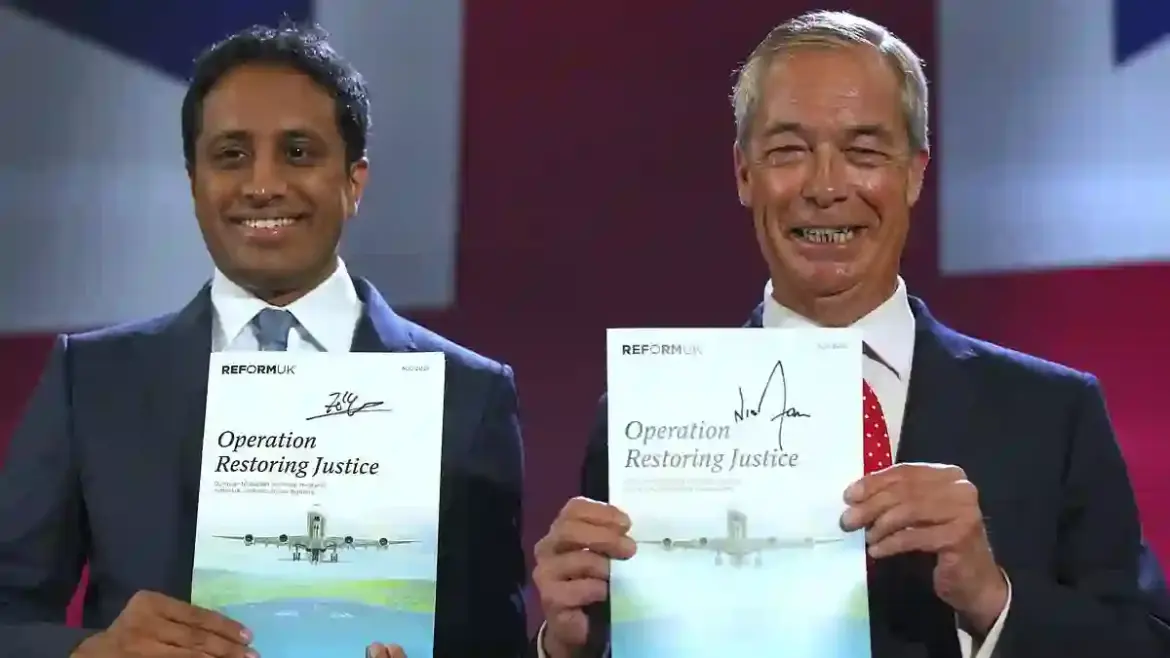Nigel Farage has never been one to play it safe, but his latest press conference didn’t just bend the rules—it ripped them up entirely.
What unfolded wasn’t your standard political speech.
Instead, it was a bold declaration that Reform UK is ready to take immigration and asylum policy into territory that no mainstream party has dared go.
For Farage, this issue trumps even the struggling economy. He insists immigration is the single most pressing challenge Britain faces today.
And this time, he came armed with a plan that makes previous government efforts look half-hearted.
Taking Aim at the Small Boats Crisis
For years, both Conservative and Labour governments have promised to stop small boats crossing the Channel.
Yet, under Sir Keir Starmer’s leadership, the number of arrivals has hit record levels. Farage’s message was clear: enough is enough.
Central to Reform’s plan is deterrence. The party says it would build detention camps for up to 24,000 people, where all new arrivals would be processed before being sent back to their countries of origin.
Farage and his ally Zia Yusuf believe deals can be struck—sometimes with financial incentives—to ensure those returns actually happen.
Breaking Away From Human Rights Rules
Perhaps the most controversial element is Reform’s determination to pull Britain out of the European Court of Human Rights (ECHR) and scrap the Human Rights Act.
These legal frameworks, Farage argues, have tied Britain’s hands and blocked tougher measures like the Rwanda scheme.
He went even further, proposing a five-year suspension of the 1951 UN Refugee Convention.
The aim is to stop “activist judges” and human rights lawyers from using loopholes to delay deportations.
It’s a strategy built on making the UK less attractive to those considering the dangerous Channel crossing.
And unlike the Conservatives, Farage claims Reform has the courage to follow through.
Labour’s Piecemeal Response
While Reform laid out sweeping changes, Labour has stuck to small, piecemeal measures—signing new agreements with France, promising faster appeals, and tweaking procedures at the margins.
Starmer, once a human rights lawyer himself, shows little appetite for pulling out of international treaties.
Even former Labour figures like Lord Blunkett have suggested a more radical rethink, but Starmer seems unwilling to take that leap.
The Moral Dilemma
Still, Farage’s tough talk raises difficult questions.
What happens to genuine refugees fleeing war and persecution? During the press conference, journalists pressed him on whether Reform’s blanket approach could lead to people being sent back to face torture or death.
Farage’s response was stark: there is no middle way. Either Britain acts decisively, or it does nothing.
But critics argue this ignores the moral responsibility to protect those in genuine need.
The Challenge of Deporting Long-Term Residents
Another thorny issue is the mass deportation of illegal immigrants already living in Britain.
Farage claims Reform would send back 600,000 people in its first term.
Yusuf suggested the real figure could be over one million.
But many of these individuals didn’t arrive by boat. They overstayed visas or came through other routes.
Some have lived in the UK for decades, building families, homes, and jobs.
Should they really be uprooted after so many years? And how would authorities even track them all down?
Where Reform’s Plan Feels Harsh
While the plan has energy and clarity, critics say parts of it sound draconian.
The idea of a “deportation department” evokes unease, with some questioning whether mass removals of long-settled residents would even be acceptable to the British public.
This is where Conservative figures like Kemi Badenoch might step in—late, but with a chance to craft policies that balance toughness with compassion.
If she can offer something both effective and humane, she may yet reclaim ground lost to Farage.
A First in British Politics
Love him or loathe him, Farage has managed what no other mainstream politician has done: present a detailed, uncompromising plan to reduce illegal immigration that isn’t easily dismantled by human rights law.
The bigger question now is whether he can go further—by tackling Britain’s heavy reliance on legal immigration as well.
That may prove to be an even greater test.
Final Word
Farage’s press conference was a political shockwave—part radical manifesto, part provocation to the establishment.
Not every detail is watertight, and some proposals raise more questions than answers.
But for the first time in years, one politician is offering a plan that could fundamentally reshape Britain’s immigration debate.



